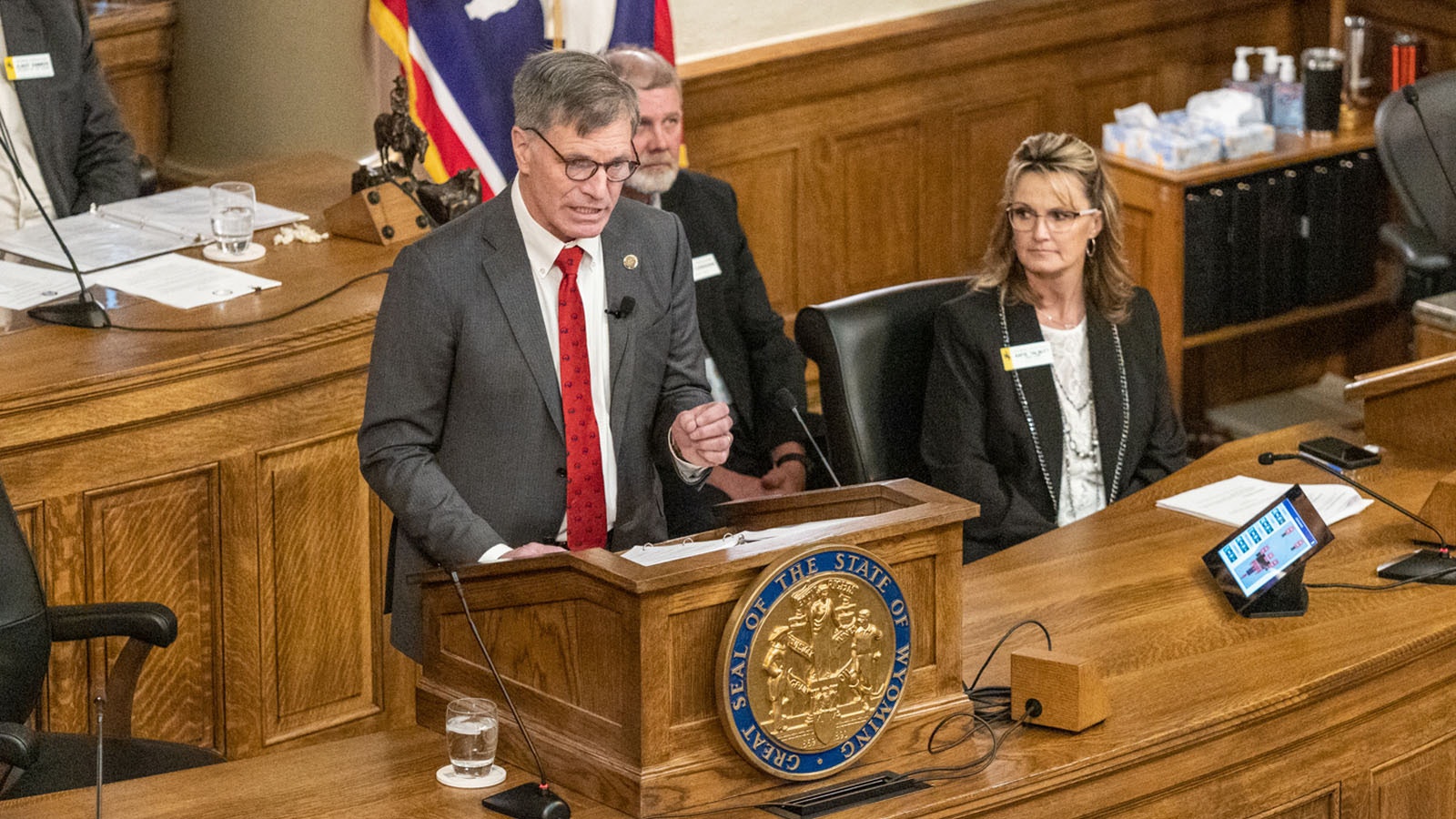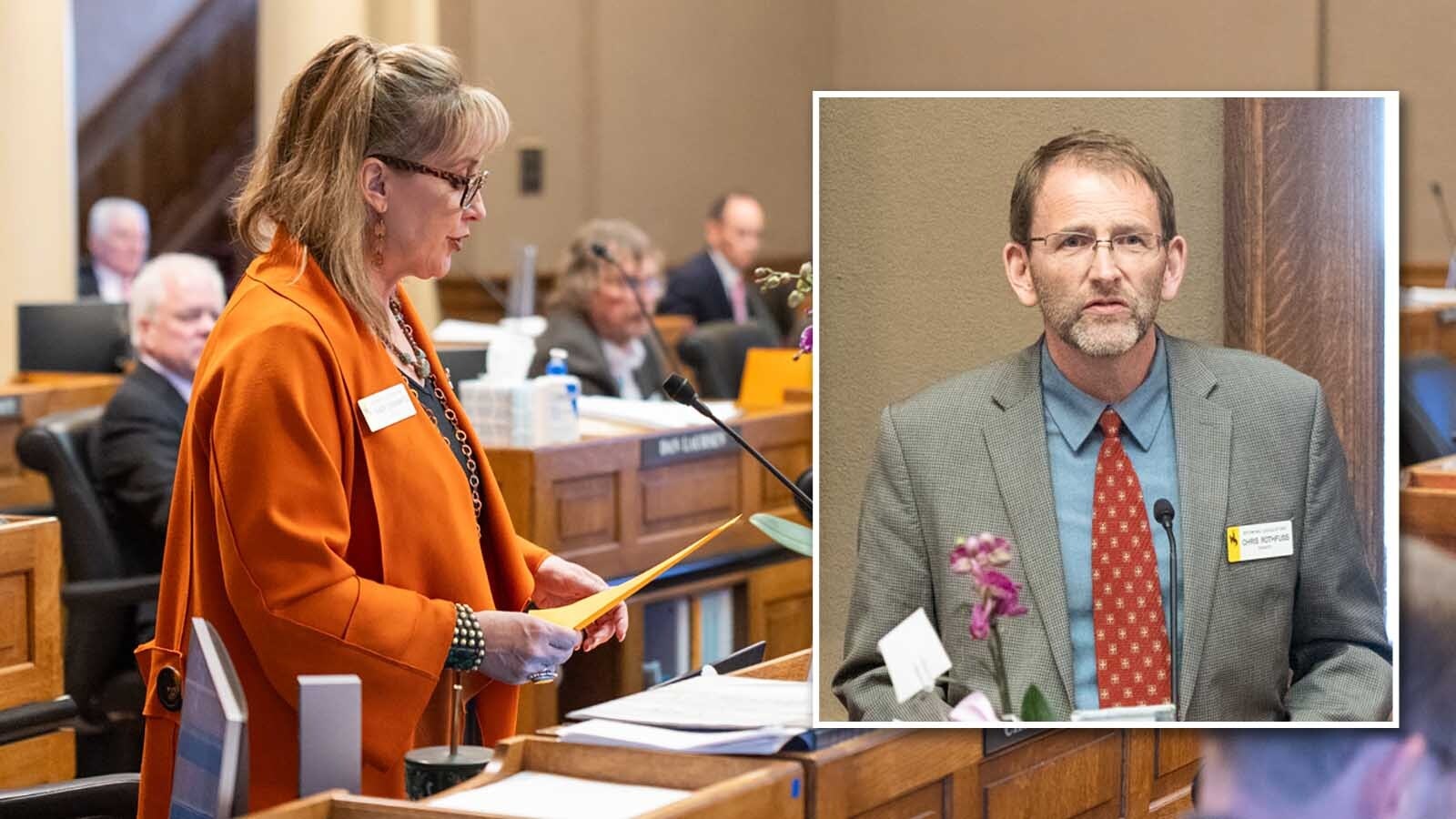Jen Davis, head of Health and Human Services for Gov. Mark Gordon, says the governor supports one of two bills under consideration by the Wyoming Legislature to expand Medicaid coverage.
The federal America Rescue Plan Act allows states to extend postpartum coverage offered through Medicaid to mothers for a 12-month period. The Legislature is considering funding Medicaid expansion through a state plan amendment.
Medicaid support in Wyoming now ends after 60 days. House Bill 4 would cover postpartum care such as visits with doctors, hospital costs, and mental and behavioral health services.
Reversal For Governor
During a Wednesday House Labor, Health and Social Services Committee meeting, Davis said Gordon supports the postpartum bill for maintaining women’s health and keeping young children alive.
It’s a departure from his prior stance on Medicaid expansion as a whole.
In fact, Gordon was one of 25 governors who in December sent a letter to President Joe Biden asking him to end the federal COVID-19 public health emergency by April, saying expanded Medicaid costs are squeezing their states for millions of dollars.
Michael Pearlman, spokesman for Governor Gordon, said HB 4 is not comparable to a full Medicaid expansion.
“The governor’s support is specifically because this is limited in scope to postpartum women and only extends it for a limited period of time from 60 days to 12 months,” Pearlman said.
What Is It?
Since the beginning of the pandemic, Medicaid programs have been prevented from dropping any enrolled Medicaid members during the federal Public Health Emergency. In response to the pandemic, the 2020 Families First Coronavirus Response Act temporarily extended postpartum medical benefits to mothers for one year.
At the end of the year, children remained eligible for Medicaid if their household incomes were at or below 154% of the federal poverty level, and mothers remained eligible for Medicaid if they were at or below the modified adjusted gross income, $873 per month for a family of three.
Gordon has been opposed or lukewarm on permanent Medicaid expansion in Wyoming during his first term in office. His support for the Medicaid Twelve Month Postpartum Coverage bill shows Gordon would prefer the program be supported on a state level.
The Wyoming Department of Health estimates the expansion would benefit 2,000 mothers a year in the Cowboy State.

Mental Health
Under the current state plan, new mothers can receive at least 30 covered mental health visits over the course of their postpartum year.
Sheila Bush, executive director of the Wyoming Medical Society, said one in every eight mothers experience postpartum depression and that “those mental health services are critically important.”
Davis also spoke to the issue of maternal depression and the already-high rate of suicide in Wyoming, the highest per capita in the nation.
“We feel that it is really important for women’s health, in order for women to be able to parent and to be able to have healthy births and move forward,” Davis said. “That is where the governor stands and would really like to see us ensuring that as a pro-life state we’re really taking care of women.”
Disagreement
State Rep. Jeanette Ward, R-Casper, a staunchly conservative freshman legislator and member of the Labor Committee, disagrees.
She mentioned how Gordon appointed Judge Melissa Owens in the Ninth Judicial District in Teton County. Owens put a pause on Wyoming’s abortion trigger ban law last year, which would have automatically made abortion illegal statewide.
“So, is the governor pro-life?” Ward questioned Davis.
Davis said she believes that the governor is pro-life.
Ward also made a point to clarify earlier in the meeting that the bill only applies to women because, “It’s women who can get pregnant.”

Health Risks
According to a Brown University study released Tuesday, the United States has the highest infant mortality rate of all developed nations.
Kristen Page-Nei, government relations director for the American Cancer Society, said longer Medicaid coverage leaves more time to diagnose cancer through routine care. She said there is an increased risk for certain cancers during pregnancy and shortly after delivery.
Rep. Mike Yin, D-Jackson, spoke to the many post-pregnancy complications that can occur that leave hospitals on the hook for uninsured people.
The more conservative members of the Labor Committee showed some skepticism about the health benefits of the expansion.
Rep. Sarah Penn, R-Riverton, provided one counter-perspective, saying carrying an infant decreases a mother’s risk of breast cancer over the long term.
Rep. John Bear, R-Gillette, said there is data showing the majority of postpartum complications are incurred within the first six weeks after pregnancy, which already are taken care of under current postpartum coverage.
He also expressed concern about the number of providers that will be available to provide for the postpartum expansion and what the effects of the expansion will be. He said the strain on providers could squeeze out patients who need health care the most.
“I haven’t heard a real impetus for this extension,” he said. “What I have heard is that money is available and we want to extend it and make use of that.”
Growing Services
There has been a growing movement of referring to the 12-week period after pregnancy as the fourth trimester.
“Babies do so much better when moms are healthy,” Bush said. “Both physical health and mental health are a big part of that.”
According to the text of HB 4, the Medicaid extension would cost Wyoming an estimated $3.8 million on a biennial basis, which would be matched by $3.8 million in federal money.
Penn, a health care professional, said the reimbursement rate to health care providers by Medicaid is already “very poor.”
Wyoming Medicaid reimburses the eligible health care expenses of Medicaid enrollees directly to the health care providers who have provided the services.
Kim Deti, communications director for the Wyoming Department of Health, said if an enrolled client needs to go to the doctor, the doctor provides a claim to Wyoming Medicaid, and then Wyoming Medicaid pays the doctor for the services provided. Wyoming Medicaid uses the combination of federal and state funding to reimburse healthcare providers.
Bush said the inability to provide care to a young mother “sometimes weighs heavier” on staff than the lack of reimbursing that sometimes occurs.
Not Limited To Postpartum
Scott Centorino, a senior fellow for the Foundation for Government Accountability, a nonprofit public policy think tank, also weighed in.
“This is full Medicaid coverage, this is not limited to postpartum care,” Centorino said. “It’s the whole suite of state benefits.”
Texas has initiated six months of postpartum coverage with an additional four months of coverage for women who experience miscarriages. Its program is limited to postpartum care.
Centorino said the legislation would eliminate some better private insurance options for certain women who would qualify for the expanded Medicaid coverage.
Rep. Ken Pendergraft, R-Sheridan, also spoke against the bill, seeing governmental involvement in health care as a breach of liberty.
“Whenever an individual cedes responsibility, they cede liberty,” he said. “Whenever someone is making choices for me, I’ve given up a piece of my liberty.”
U.S. federal law requires states to provide pregnancy-related Medicaid coverage through 60 days postpartum.
Although the postpartum expansion passed through the Labor Committee in August, the panel now has a significantly different look.
The majority of the committee is now made up by freshman legislators. In addition, nearly every member is new to the committee. Yin is the only member to have ever served on the committee before.
Discussion of the bill will continue at 8 a.m. Friday.





